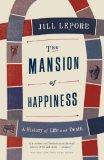Summary | Excerpt | Reviews | Beyond the Book | Readalikes | Genres & Themes | Author Bio

Critics' Opinion:
Readers' Opinion:
First Published:
Jun 2012, 320 pages
Paperback:
Mar 2013, 320 pages
 Book Reviewed by:
Book Reviewed by:
Elizabeth Whitmore Funk
Buy This Book
No game is more didactic: "At this amusement each will find / A moral fit t'improve the mind." Whether it's amusing is difficult to say. The Mansion of Happiness is hard to finish, mostly because the wages of sin are so harsh - "Whoever becomes a SABBATH BREAKER must be taken to the WHIPPING POST and whipt" (a retreat of six squares) - that you're forever going backward and losing turns. However popular the Mansion of Happiness was with the parents who purchased it, the game boards that survive in archives are in such suspiciously good condition that at least one historian has wondered whether children - who must, invariably, have been given the game as a gift - could ever bear to play it. Its rules read like a sermon: "Whoever possesses AUDACITY, CRUELTY, IMMODESTY, or INGRATITUDE, must return to his former situation till his turn comes to spin again, and not even think of Happiness, much less partake of it."
Milton Bradley was born in Vienna, Maine, in 1836, two centuries after Daniel Bradley crossed the Atlantic, by which time the Bradleys had not yet begun to think of happiness, much less partake of it. He was the great-great-grandson of Jonathan Bradley, one of the many members of the Bradley family killed by Indians. He was his parents' only son. He was named after the Puritan author of Paradise Lost. As a boy, he read Pilgrim's Progress. When he was ten, his family moved to Lowell, Massachusetts, so that his father, Lewis, an insolvent, itinerant craftsman, could work in the textile mills.
The nineteenth century was an age of machines: the steam engine, the cotton gin, the power loom. Inventors abounded; the patent office could barely keep up. "Men of progress" they were called, and "conquerors of nature." Their machines were better than poetry. The genius of Eli Whitney was said to rival that of Shakespeare. The head of the U.S. Patent Office declared the steamship "a mightier epic" than the Iliad, and any fool could see that James Watt had a thing or two over Cicero. Machines were thought to be the engines of progress, the "index of the degree in which the ben- efits of civilization are anywhere enjoyed," as James Mill, John Stuart Mill's father, put it, in his six-volume History of British India. (Having never been to India proved no obstacle to Mills's claiming that Indians were stalled on the march to progress, as measured by their "great want of ingenuity and completeness in instruments and machinery.")
But the age of machines had its critics. Thomas Carlyle considered faith in machines a kind of spiritual bondage, something akin to a religious fal- lacy but worse, and every bit as much a delusion as seventeenth-century New Englanders' belief in witchcraft. Faith in progress is faith in the future, but if we think that machines liberate us from the past, Carlyle argued, we are wrong; it is we who are their prisoners. "Practically considered," he wrote, "our creed is Fatalism; and, free in hand and foot, we are shackled in heart and soul with far straighter than feudal chains." We may be blind to those shackles, blinded by a fog as thick as London's, as he put it, but we are just as surely "fettered by chains of our own forging."
What Carlyle was describing, and what the Bradleys, like everyone else, were caught up in, was a quite extraordinary transition, a shift in where people were seeking answers to questions about the meaning of life: from the ancients to the moderns, from the pulpit to the patent office, from books to machines, from the arts to the sciences. Not just the source but the nature of authority changed. Answers you used to find in the past you were now expected to find in the future. And you were supposed to find them yourself.
Excerpted from The Mansion of Happiness by Jill Lepore. Copyright © 2012 by Jill Lepore. Excerpted by permission of Knopf, a division of Random House, Inc. All rights reserved. No part of this excerpt may be reproduced or reprinted without permission in writing from the publisher.





The Flower Sisters
by Michelle Collins Anderson
From the new Fannie Flagg of the Ozarks, a richly-woven story of family, forgiveness, and reinvention.

The House on Biscayne Bay
by Chanel Cleeton
As death stalks a gothic mansion in Miami, the lives of two women intertwine as the past and present collide.

The Funeral Cryer by Wenyan Lu
Debut novelist Wenyan Lu brings us this witty yet profound story about one woman's midlife reawakening in contemporary rural China.
Your guide toexceptional books
BookBrowse seeks out and recommends the best in contemporary fiction and nonfiction—books that not only engage and entertain but also deepen our understanding of ourselves and the world around us.